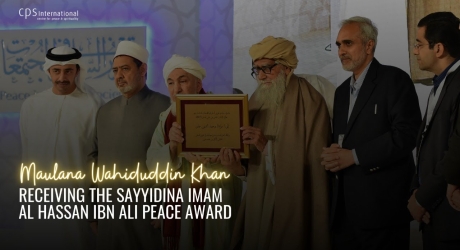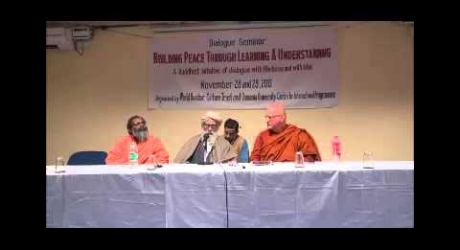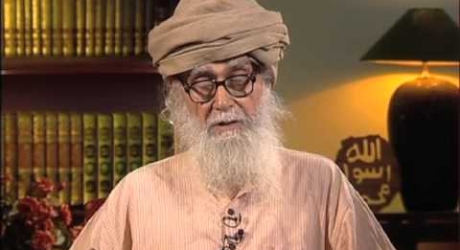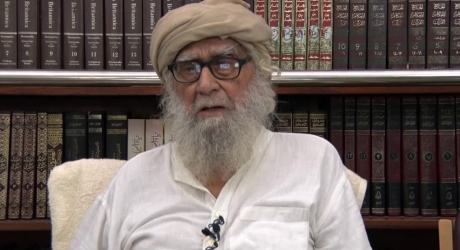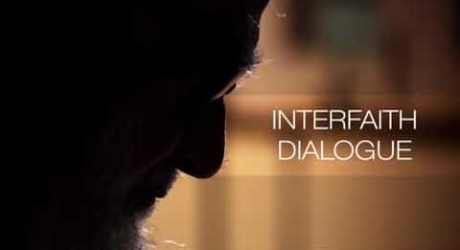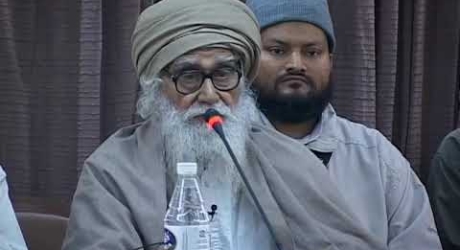There’s much talk today about interfaith dialogue. It seems to be a relatively new thing. Why do you think people are talking about it today?
It isn’t that dialogue between followers of different faiths did not take place earlier. Yet, maybe not much of it took place in the formal sense, because for dialogue you need communications to relate, to dialogue with others, and in the past, means of communication were limited. Today, communications are highly advanced, and so not only is dialogue much more possible but it is also a pressing need.
I think interaction and intellectual exchange between people of different faiths is very important. We are really blessed to find ourselves in a period of history where the possibilities of such exchange and interaction abound. These possibilities were very limited in earlier times, and so we are truly fortunate.
The theme for the present talk is interfaith dialogue. The first question in this regard is: What is the purpose of interfaith dialogue? It is generally accepted that the purpose of interfaith dialogue is to establish harmony among religious groups. The other question is: according to history, this kind of interfaith dialogue has been going on since long, may be several hundred years. Perhaps the earliest was the one held in Chicago in 1893. In this dialogue people from all major religions were present. But, according to my experience, all these exercises were fruitless and resultless. No positive results of these can be cited. Religious harmony among different religious groups is still a distant dream. If this was the purpose of dialogue, we have to reassess the whole matter. The question is why did these exercises fail?
Dialogue not for Uniformity or Debating
I would say that their method was not right. The method adopted by these interfaith dialogues was unnatural. According to my experience, there were two models of this interfaith dialogue. The first model was based on the concept of uniformity. According to this concept, all religions are one and the same, that there is an essential unity in all religions. We have to discover this unity and make people aware of it. According to this way of thinking, achieving unity among all religions is the way through which harmony can be expected between religious groups. But, this exercise failed completely. There are thousands of big names and great minds behind this method. So, why did it fail?
The reason is that it was an unnatural concept. Because, uniformity is against the Creation Plan of God. In nature, there is no uniformity. Nature believes in differences. Both the material and human worlds are based on differences. You cannot find any two men or any two women who are alike. The word “uniformity” is found in dictionary, but not in society or the human world. Since this formula of establishing uniformity was unnatural and not in accordance with the Creation Plan of God, it was but natural for it to fail.
The other model for interfaith dialogue is based on debating. That is, this model believes that truth is one. The truth that someone is following is the only truth, and not anything else apart from it. So, everyone, in this model, tries to establish his superiority. This kind of model also failed. We know that many conferences of this kind have been held on interfaith dialogue. Lot of literature has been published on this subject. But, we see that these kind of exercises failed to establish harmony. Now, the question is to reassess the whole matter. You have to find a formula other than these two formulas.
Dialogue for Mutual Learning: Faruqi Formula
I have studied this matter. Also, I have participated in a number of dialogues throughout the world, both at the national and international levels. After study and experience, I can say that I have discovered a third formula. According to my perception, this third formula is quite in accordance with the Creation Plan. And it is undoubtedly feasible, there is no question of it failing. This third formula is based on a tradition. It can be called the Faruqi formula. It was adopted by Umar bin al-Khattab, who was the second caliph of Islam. We read this about him in books: Kana umar yatallamu min kulli ahad. It means: He used to learn from everyone. This third formula is based on the learning process. When I apply this on the concept of interfaith dialogue, I would say that the third formula is the formula of mutual learning. It means that the purpose of interfaith dialogue is neither to discover uniformity among religions nor to establish one’s superiority over other religions. Instead of what these two formulas are based on, the third is based on mutual learning. All participants in the dialogue must try to learn from each other. I can say this is completely based on the law of nature. It is workable, there is no doubt about it.
This formula is not a religious formula, it is a universal formula. In every walk of life, in every discipline, we use or exercise the same formula. For example, in education, industry, business, or social life, everywhere we try to learn from others. Mutual learning is the basic formula of life. So, why to single out religion? Why not apply it on religion as well? If we apply this universal formula on interfaith dialogue, in this sense, interfaith dialogue becomes part of the universal process. It doesn’t then pertain to only religion.
I have learnt a lot from all my experiences of participating in interfaith dialogue. I have studied different religious literature and I have participated in many interfaith dialogues. I have learnt a lot. I never tried to establish my superiority. I simply wanted to learn from others. I always learn from books and experiences.
Follow One and Respect All
Then, there is a question. Religion is an issue of conviction. When I say I believe in “so and so” religion, it means I take it as the truth with the capital T. Without this, I cannot have conviction in my mind. If religion fails to give conviction then it has no use. The basic purpose of religion is to give you conviction regarding the purpose of life and scheme of existence. I can say that I have great conviction in Islam. I have discovered Islam as my faith. I believe in it with all conviction. I have no doubt about it. According to my perception, Islam is the truth with the capital T. But, I can say that on account of this belief, I never developed hate for anyone. I love every human being and every religion. This is a fact. All those who know me can say that I have not an iota of hate for anyone. I respect every religion from my heart.
I can say that this is possible for every human being. This is because a human being has enormous capacity. Man is able to live with contradictions. It is quite possible for the human mind. An American writer, Walt Whitman (1819-1892), has said: “I am large enough to contain all these contradictions.” So, there is no question that if you believe that Religion A is the truth with capital T, then you would fail to respect other religions. Our mind is able to live with both concepts. Believing that your religion is true and at the same time giving respect to other religions is possible. This is not a matter of lip service.
Interfaith dialogue means religious learning. As far as establishing harmony is concerned, it is another subject. The best formula for it is given by a reformer in these words: peaceful coexistence. The UN has already adopted this formula. This same formula is also applicable to religious groups. I would say that as far as social harmony is concerned, we have to adopt the principle of coexistence. And as far as interfaith dialogue is concerned, we have to take it as a process of mutual learning. This is my finding, my experience and my discovery. I myself have adopted it in my life. For me, this formula is not simply a matter of giving speech. It is my way of life. By nature, I am a seeker. I always try to learn from others. My seeking spirit has no end. I learn from secular people and so do I try to learn from people of other religions. There is no difficulty in doing this.
Religious Belief and Social Harmony
We have to reassess the whole matter regarding interfaith dialogue. When those two models failed to yield any positive result, we have to try to avail of another formula. As I earlier said, the model based on uniformity failed in terms of result. The model based on debate too has failed. So, what is the purpose of repeating these models? We have to try to find out some other formula. That formula is what I call the Faruqi formula, that is, one based on mutual learning. We have to separate the two issues of social harmony and religious truth. We are all seekers. We have to try to find the truth. This is a continued process, and an eternal one. We have to try to achieve conviction. For this we have to study and interact. This is a process. Interfaith dialogue is for this purpose of mutual learning and sharing. Everyone must share his experience regarding the truth. Everyone must try to learn from other groups. This is healthy interaction. This kind of interfaith dialogue is a healthy interaction. Interaction is very important. Interaction, dialogue, exchange of thought are very important. But, they are not meant for establishing your superiority over others, they are only for the purpose of learning. Learning has no end. There are limitless things that we need to learn. The universe of facts is limitless, it has no end. Thus, our learning process is an eternal process, an unending process. As far as social harmony is concerned, we have to adopt the tested formula of peaceful coexistence. And as far as interfaith dialogue is concerned we have to take it as learning, exchange of thought and sharing. By following this method, we can achieve both the goals. One goal is to discover the truth, the second is to establish harmony. By taking interfaith dialogue as mutual learning, we will be able to continue our process towards seeking the truth. By adopting the formula of coexistence we can establish harmony in society. This is my experience. I can say this is according to the law of nature or the Creation Plan of God. There is no contradiction this formula has with nature.
This is the only formula for interfaith dialogue. It is very clear that dialogue for the sake of dialogue is nothing. So, if you want to take dialogue for some purpose, if you want dialogue to have some purpose, then you have to discover that purpose. According to my experience, the purpose is sharing, mutual learning and interaction.
Then if we have set a goal, we have to adopt a peaceful method for the achievement of that goal. If a method creates problems and negative thinking, then it is not a method at all. A method has to be peaceful, a method is one after following which, further problems are not created. A method must be highly peaceful. The problem-free method is a method, otherwise it is not a method. What I have suggested in this regard is a problem-free method, one which creates no problems at all. According to my experience, this is my finding. I have adopted it as the way of my life.





